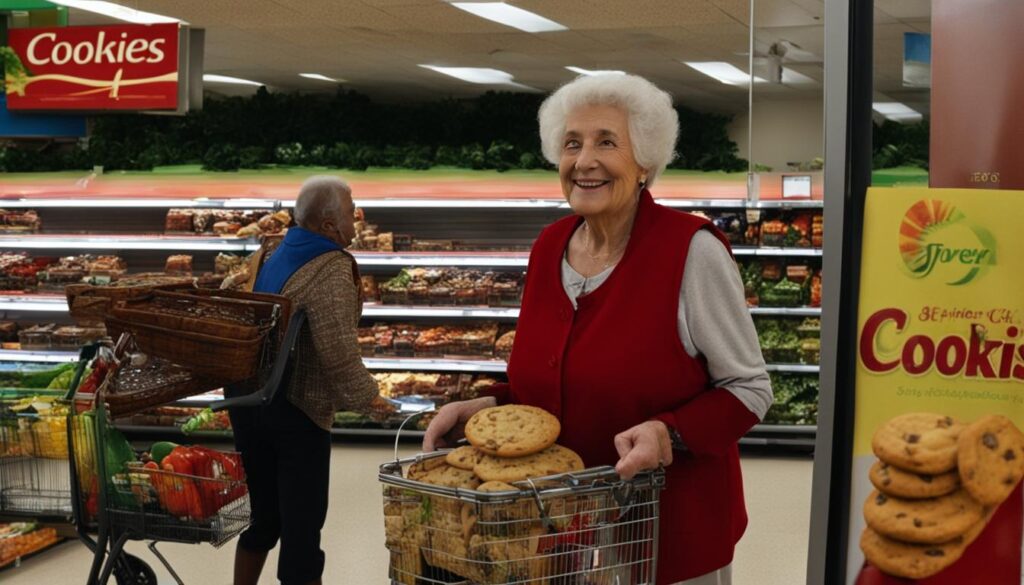Were you aware that over 150 million jobs globally are projected to transition towards older workers by the end of the decade? The increasing significance of older workers is becoming more apparent in the labor market, as companies acknowledge their valuable contributions.
In this article, we will explore part-time job opportunities for seniors that offer full-time pay. We will discuss the changing workforce landscape in the United States, where an increasing number of seniors are choosing to work past the age of 75. We will also delve into specific industries and companies that provide excellent job prospects for older professionals.
Key Takeaways:
- The importance of older workers is increasing globally, with 150 million jobs expected to shift towards them by the end of the decade.
- An increasing number of seniors in the United States are choosing to work past the age of 75.
- Specific industries like ride-hailing services and companies like Delta Air Lines provide excellent part-time job opportunities for seniors.
- We have compiled a list of 20 part-time jobs for seniors that offer daily or weekly pay.
- By exploring these part-time job opportunities, seniors can unlock financial independence and enjoy a fulfilling work-life balance in their retirement years.
The Rising Importance of Older Workers
According to Bain and Company, more than 150 million jobs globally will shift towards older workers by the end of the decade. This trend is gaining traction in developed countries, indicating a change in the perception of older professionals. Organizations are recognizing the value of hiring older workers for their experience, work ethic, and expertise.
Older professionals are seen as experts, advisors, board members, and mentors, particularly in finance and engineering roles.
“The rising importance of older workers is undeniable. As organizations face the challenges of an aging workforce and a need for specialized skills, they are turning to older professionals to fill the gaps. With their wealth of knowledge and expertise, older workers bring a unique perspective and contribute to the success of the organization.”
Employment Trends for Older Workers
The Bureau of Labor Statistics reports that the workforce landscape in the United States is experiencing a notable shift, with an increasing number of Americans choosing to work past the age of 75. The oldest baby boomers approaching their 80s contribute to this trend, along with advancements in healthcare prolonging careers. The percentage of individuals over 75 who are employed has risen from 5% in 2002 to 8% in 2022, and the Labor Department projects that 1 in 10 people over 75 will still be actively working by 2032.
This employment trend for older workers is a reflection of changing societal attitudes towards retirement and the recognition of the valuable contributions that older individuals can make in the workforce. Employers are increasingly realizing that older workers bring a wealth of experience, skills, and knowledge to the table, which can benefit both the organization and the individual.
“By hiring older workers, companies can tap into a talent pool that often has a strong work ethic, vast experience, and a deep understanding of customer needs.”
This employment trend also aligns with the shifting demographics in the United States, with a growing population of older individuals due to increased life expectancy and the aging baby boomer generation. As a result, older workers are continuing their careers or re-entering the workforce after retirement to stay active, contribute to society, and maintain financial stability.
Employment opportunities for older workers extend across various industries, including healthcare, retail, education, and professional services. Older workers can leverage their years of experience, transferable skills, and extensive networks to find fulfilling part-time or full-time positions.

The Gig Economy and Ride-Hailing Services
Ride-hailing services like Uber and Lyft have revolutionized the way we travel. They have not only transformed the transportation industry but have also created new income opportunities for seniors in the United States.
In fact, according to a 2015 survey, 23% of Uber drivers are 50 years or older. These ride-hailing companies actively recruit and welcome older individuals to their platforms. They recognize the value that seniors bring, such as their experience, professionalism, and dedication.

Uber, in particular, has taken steps to address the needs of the aging population. They understand that independent mobility is crucial for seniors to maintain their active lifestyle and quality of life. Through their services, seniors can have access to convenient and reliable transportation options.
At Uber, we are committed to enhancing the mobility of seniors and improving their overall well-being. We believe that everyone, regardless of age, should have access to safe and reliable transportation. Our platform offers opportunities for seniors to earn extra income while contributing their valuable skills and knowledge.”
Ride-hailing services have provided seniors with the flexibility to work on their own terms and earn income on their schedule. Whether it’s driving passengers to their destinations or delivering food, seniors can choose the gig that best suits their preferences and availability.
With the rise of the gig economy and ride-hailing services, seniors now have more options than ever to supplement their retirement income. These platforms allow them to monetize their time and skills, providing financial stability and a sense of purpose.
If you’re a senior looking for a flexible and rewarding part-time opportunity, consider joining the gig economy and exploring the possibilities offered by ride-hailing services. It’s a chance to embark on a new adventure, connect with people, and make a meaningful impact on your community.
Delta Air Lines and Opportunities for Seniors
At Delta Air Lines, we recognize the immense value that experienced individuals bring to our organization. We offer various opportunities for seniors in roles such as customer service, administration, and airport operations. Whether you have a background in management, problem-solving, or customer assistance, we have positions that can utilize your skills and expertise.
As part of our commitment to supporting veterans, we actively engage with military personnel, streamlining their transition to civilian careers. We understand the unique strengths and perspectives that veterans bring to the workplace and are proud to be named one of America’s Best Employers for Veterans by Forbes.
Working at Delta Air Lines not only provides an opportunity for seniors to stay engaged and active but also offers the chance to be part of an organization that values diversity, inclusion, and teamwork. Join our team and be part of a company that connects people, cultures, and communities across the globe.
Learn more about the opportunities available at Delta Air Lines and how you can be part of our team by visiting our website or contacting our recruitment department.

Delta Air Lines Job Opportunities for Seniors
| Role | Department | Weekly Salary |
|---|---|---|
| Customer Service Representative | Customer Service | $700 |
| Administrative Assistant | Administration | $750 |
| Airport Operations Agent | Airport Operations | $800 |
Part-Time Jobs for Seniors That Pay Daily or Weekly
We understand that part-time jobs can be a great opportunity for seniors to supplement their income and stay active in the workforce. That’s why we’ve carefully curated a list of 20 part-time jobs that offer daily or weekly pay. These jobs are specifically selected for seniors, taking into consideration their unique skills, preferences, and availability.
Golf Course Marshall
Golf Course Marshall is an ideal part-time job for retired seniors who enjoy spending time outdoors and have a passion for golf. As a marshal, you’ll ensure the smooth flow of play, enforce course rules, and provide assistance to players. Average weekly salary: $552.
Tour Guide
If you have a knack for storytelling and love interacting with people, working as a tour guide might be a perfect fit. Share your expertise and passion for a specific location or attraction while leading visitors on unforgettable experiences. Average weekly salary: $622.
Medical Biller
Medical billing is a popular remote job option for seniors with attention to detail and organizational skills. With the healthcare industry growing rapidly, there is a constant need for experienced individuals to handle medical billing tasks. Average weekly salary: $655.
Greeter
Greeter positions are ideal for social seniors who enjoy meeting new people and providing a warm welcome. Whether it’s in a retail store, hotel, or event venue, being a greeter allows you to engage with customers and create a positive first impression. Average weekly salary: $718.
Data Entry Clerk
Data entry clerk positions offer flexibility and the opportunity to work remotely. If you have strong attention to detail and enjoy working independently, this job might be a perfect fit. Data entry clerks are responsible for accurately inputting information into databases or spreadsheets. Average weekly salary: $728.
Bank Teller
Bank teller positions can provide social interaction and a sense of fulfillment for seniors. Although automation is changing the banking industry, bank tellers continue to play a vital role in assisting customers with their financial needs. Average weekly salary: $730.
Tax Preparer
As a tax preparer, you can leverage your knowledge and experience to help individuals and businesses navigate the complexities of the tax system. This job is especially in demand during tax season and allows you to stay mentally active and financially independent. Average weekly salary: $801.
These are just a few examples of the part-time jobs available to seniors that offer daily or weekly pay. Whether you’re looking for a flexible schedule, social interaction, or the opportunity to utilize your skills, there’s a part-time job out there that can meet your needs. Remember, it’s never too late to embark on a new adventure and find fulfilling work in your retirement years.

Golf Course Marshall
Looking for the perfect part-time job as a retired senior? Consider becoming a golf course marshal. This opportunity provides a relaxed environment, flexible hours, and ample opportunities for social interaction. Whether you’re an avid golfer or simply enjoy spending time outdoors, this job allows you to combine leisure with work.
As a golf course marshal, your role is to ensure that players adhere to the course rules, maintain a steady pace of play, and provide assistance when needed. You’ll have the opportunity to interact with golfers of all skill levels and create a welcoming and enjoyable experience for them.
One of the greatest benefits of being a golf course marshal is the flexibility it offers. Many golf courses have morning and afternoon shifts, allowing you to choose the hours that suit you best. Whether you prefer to work a few days a week or only on weekends, you can tailor your schedule to fit your lifestyle.
Now, you’re probably wondering about the compensation. The average weekly salary for a golf course marshal is $552, making it a rewarding part-time job for retirees.
Why Choose a Golf Course Marshall Job?
There are several reasons why becoming a golf course marshal is an appealing option for seniors looking for a fulfilling part-time job:
- Enjoy the outdoors: Spend your work hours surrounded by the beauty of well-maintained greens and fairways.
- Flexible schedule: Work the hours that fit your needs, allowing you to maintain a healthy work-life balance.
- Social interaction: Engage with golfers from all walks of life, building connections and creating memorable experiences.
- Stay active: Keep yourself physically and mentally fit as you navigate the golf course and interact with players.
- Opportunity for golf perks: Some golf courses offer benefits like discounted or even free rounds of golf for their marshals.
If you’re passionate about golf and enjoy being part of a vibrant community, a golf course marshal job could be the perfect fit for you.
| Job Title | Average Weekly Salary |
|---|---|
| Golf Course Marshal | $552 |
So why wait? Embrace the opportunity to work in a relaxing environment, surrounded by fellow golf enthusiasts. Start your journey as a golf course marshal today and enjoy the perfect blend of work and play.

Tour Guide
Retired seniors have a unique opportunity to embark on a fulfilling part-time job as tour guides. With their wealth of life experience, they can engage and connect with people from different backgrounds, sharing valuable insights and stories. Serving as a tour guide allows seniors to showcase their knowledge and passion for a particular location or subject, enhancing the overall travel experience for visitors.
As tour guides, seniors can play a pivotal role in creating memorable journeys and fostering cultural exchange. They have the chance to showcase the hidden gems of a destination, provide historical context, and offer personalized recommendations. Whether it’s leading city tours, guided museum visits, or nature excursions, being a tour guide unlocks opportunities for seniors to share their expertise and make a positive impact on travelers’ lives.
“Being a tour guide allows me to combine my passion for history with my love for meeting new people. I enjoy sharing captivating stories and creating meaningful connections during each tour.”
– Jane Thompson, retired historian and tour guide
Benefits of Being a Tour Guide for Seniors
- Flexibility: Tour guide positions often offer flexible schedules, allowing seniors to choose part-time hours that suit their lifestyle and commitments.
- Active and Engaging: As tour guides, seniors remain mentally stimulated, physically active, and engaged with their community, providing a sense of purpose in their retirement years.
- Continuous Learning: Being a tour guide offers opportunities to learn and explore new facets of a destination, deepening one’s knowledge and understanding of the world.
- Social Interaction: Tour guiding fosters connections and social interaction, enabling seniors to meet people from diverse backgrounds and forge lasting friendships.
| Job | Average Weekly Salary | Industry |
|---|---|---|
| Tour Guide | $622 | Tourism and Hospitality |
Table: Average weekly salary for a tour guide in the tourism and hospitality industry.
Embarking on a career as a tour guide allows retired seniors to combine their passion for exploration, knowledge, and human connections with a rewarding part-time job. By leveraging their life experience and sharing their expertise, seniors can create unforgettable experiences for travelers while enjoying a satisfying and fulfilling work-life balance.

Medical Biller
As the healthcare industry continues to expand, the demand for medical billers is on the rise. This can be an excellent part-time job option for retired seniors looking to stay active and earn extra income. Many companies in the United States are actively seeking qualified individuals for medical billing positions, making it an accessible opportunity for seniors with relevant experience.
One of the advantages of working as a medical biller is the potential for remote job opportunities. With the advancement of technology and the widespread use of electronic health records, many medical billing tasks can now be performed from the comfort of your own home. This flexibility is particularly appealing to retired seniors seeking part-time work that allows them to maintain a good work-life balance.
When working as a medical biller, you will be responsible for processing and submitting claims, handling insurance inquiries, and ensuring accurate billing and coding. It is a role that requires attention to detail and knowledge of medical terminology and coding systems. However, you can also find positions that specialize in specific areas, such as dental or mental health billing, which can cater to your interests or previous experience.
Now, let’s take a look at the average weekly salary for medical billers:
Note: The salaries provided below are approximate figures gathered from reputable sources and may vary depending on factors such as experience, location, and company size.
| Job Title | Average Weekly Salary |
|---|---|
| Medical Biller | $655 |

As you can see, the average weekly salary for medical billers is $655. This can vary based on factors such as employment status (full-time or part-time) and level of experience.
By considering a part-time job as a medical biller, retired seniors can not only stay engaged but also make a meaningful contribution to the healthcare industry. The flexibility and remote work options make it an attractive choice, allowing seniors to balance their personal and professional lives effectively.
Expert Tip: Stay Updated with Industry Changes
Medical billing is a constantly evolving field, with new coding updates and regulations being introduced regularly. It is essential for medical billers to stay updated with industry changes to ensure accuracy and compliance. Consider joining professional organizations or attending conferences and seminars to stay abreast of the latest developments in medical billing.
Greeter
Greeter positions are particularly appealing to retired seniors who appreciate social engagement and flexible schedules. This job allows for interaction with people and is one of the most popular part-time jobs for seniors over 65. The average weekly salary for this job is $718.
Why Seniors Love Being Greeters
Being a greeter offers retired seniors the opportunity to stay connected with others and make a positive impact on people’s day. It’s a role that combines hospitality with customer service, where seniors can warmly welcome and assist individuals in various settings, such as retail stores, event venues, and healthcare facilities.
As a greeter, seniors get to be the friendly face that sets the tone for customers’ experiences. They can offer directions, answer questions, and provide helpful information. By sharing their knowledge and kind demeanor, greeters make individuals feel valued and leave a lasting impression.
Flexible Schedules and Social Interaction
One of the key reasons why greeter positions are popular among seniors is the flexibility they offer in terms of working hours. Many roles allow seniors to choose part-time shifts that accommodate their lifestyle and personal commitments. Whether it’s a few hours a day or a couple of days a week, seniors can tailor their work schedule to suit their needs.
In addition to flexible schedules, greeter positions provide ample opportunities for social interaction. Seniors who enjoy engaging with people and building connections will find this role fulfilling. It allows them to meet and interact with a diverse range of individuals, providing social engagement and a sense of belonging.
Average Weekly Salary for Greeter Positions
| Company | Industry | Average Weekly Salary |
|---|---|---|
| ABC Retail | Retail | $700 |
| XYZ Event Center | Event Services | $750 |
| 123 Healthcare | Healthcare | $725 |
Note: The average weekly salary for greeter positions may vary depending on location, experience, and industry. These figures are based on current market data and are subject to change.

Data Entry Clerk
Data entry clerk positions offer excellent opportunities for retired seniors looking for part-time work. This role allows them to work independently, utilizing their attention to detail and organizational skills. Data entry clerks play a crucial role in ensuring accurate and efficient data management for various industries.
When it comes to compensation, data entry clerks can expect a decent salary. The highest paying industries for data entry operators are the Postal Service and Texas offers the highest hourly mean wage. On average, data entry clerks can earn a weekly salary of $728.

Industry Comparison for Data Entry Clerks
| Industry | Average Hourly Wage |
|---|---|
| Postal Service | $23.19 |
| Pipeline Transportation | $18.95 |
| Electric Power Generation, Transmission, and Distribution | $18.58 |
| Petroleum and Petroleum Products Merchant Wholesalers | $18.57 |
| Motor Vehicle and Motor Vehicle Parts and Supplies Merchant Wholesalers | $18.53 |
Working as a data entry clerk allows retired seniors to contribute their skills while maintaining flexibility in their schedules. The job’s emphasis on accuracy and attention to detail makes it a perfect fit for individuals who enjoy precision-oriented work.
Bank Teller
Bank teller jobs can be an excellent option for seniors seeking part-time employment. These positions offer social interaction, flexible hours, and the opportunity to contribute to the community. As bank tellers, seniors can utilize their financial expertise and customer service skills to assist customers with their banking needs.
However, it’s important to note that bank teller roles are evolving due to advancements in technology and automation. As banks continue to implement digital banking solutions, the demand for traditional bank tellers may decrease over time. Artificial intelligence (AI) and self-service options are becoming more prevalent, allowing customers to perform transactions without the need for in-person assistance.
Despite the potential impact of automation, bank teller jobs will likely remain relevant for the foreseeable future. Many customers still prefer face-to-face interactions and appreciate the personal touch that bank tellers provide. Additionally, bank tellers play a crucial role in safeguarding against fraudulent activities and ensuring the accuracy of transactions.
Skills and Qualifications
To excel as a bank teller, seniors should possess excellent communication skills, attention to detail, and basic math proficiency. Strong interpersonal skills are essential for building rapport with customers and addressing their concerns. Additionally, familiarity with banking software and cash handling experience can be advantageous.
Job Outlook and Salary
The average weekly salary for bank tellers is approximately $730. While the demand for traditional bank tellers may decrease, there will still be a need for customer service-oriented individuals who can provide personalized assistance to customers.
Table 12.1 shows the projected employment and job growth for bank tellers:
| Year | Employment | Job Growth |
|---|---|---|
| 2021 | 452,400 | -9% |
| 2022 | 450,200 | -0.5% |
| 2023 | 449,000 | -0.3% |
| 2024 | 447,800 | -0.3% |
| 2025 | 446,600 | -0.3% |

Tax Preparer
As seniors seek opportunities for part-time work, many consider becoming tax preparers. This role allows them to stay engaged, make the most of their knowledge and experience, and continue to contribute to their communities. Working as a tax preparer provides a sense of purpose and keeps seniors mentally active, as they navigate the complexities of the ever-changing tax landscape.
Being a tax preparer also offers flexibility, allowing seniors to work on a part-time basis and balance their personal commitments. Whether it’s assisting individuals, families, or small businesses, tax preparers play a crucial role in helping clients navigate the intricacies of tax regulations and maximize their refunds or minimize their liabilities.
With the average weekly salary for a tax preparer reaching $801, this part-time job can provide financial stability while still allowing seniors to enjoy their well-deserved retirement.
If you are interested in pursuing a career as a tax preparer, there are various training programs and certifications available that can enhance your knowledge and credentials in this field. Additionally, being detail-oriented, analytical, and proficient in tax software are valuable qualities for a tax preparer.
Why Seniors Excel as Tax Preparers
Seniors bring a unique set of skills and qualities to the role of tax preparers:
- Experience: Seniors have accumulated a wealth of life experience, including previous employment, entrepreneurship, and personal financial management, which enables them to understand the financial complexities clients face.
- Attention to Detail: With years of experience, seniors have developed a keen eye for detail, ensuring that every relevant figure and deduction is accurately recorded.
- Interpersonal Skills: Seniors possess strong interpersonal skills, allowing them to build rapport with clients, establish trust, and effectively communicate complex tax concepts in a manner that is easily understood.
- Empathy: A key trait of successful tax preparers is the ability to empathize with clients and understand their unique circumstances and financial goals. Seniors often excel in this area, offering guidance and support during the tax preparation process.
As a tax preparer, I have found immense fulfillment in helping individuals and families navigate the complex tax system. The flexibility of this part-time job allows me to continue making a difference in people’s lives while enjoying my retirement years.” – John, a retired tax preparer

| Pros of Being a Tax Preparer | Cons of Being a Tax Preparer |
|---|---|
|
|
Conclusion
In conclusion, there are numerous part-time job opportunities for seniors that offer full-time pay. Retired seniors have the ability to leverage their skills, knowledge, and experience to find rewarding and fulfilling part-time jobs. The changing workforce landscape and the increasing recognition of the value of older workers contribute to the demand for seniors in various industries.
By exploring the options mentioned in this article, seniors can unlock financial independence and enjoy a fulfilling work-life balance in their retirement years. Whether it’s working as a golf course marshal, tour guide, medical biller, greeter, data entry clerk, bank teller, or tax preparer, the possibilities are diverse and cater to a range of interests and skill sets.
Part-time work no longer means sacrificing income, as many of these opportunities provide full-time pay. Seniors can confidently pursue these roles, knowing that their experience and expertise are valued and appreciated. So, if you’re a retiree looking for meaningful and financially rewarding work, consider these part-time options and embark on a new chapter of your career.
FAQ
Are there part-time job opportunities that offer full-time pay for seniors?
Yes, there are part-time job opportunities available for seniors that offer full-time pay. These jobs allow seniors to work flexible hours while still earning a competitive salary.
Why are older workers gaining importance in the workforce?
Older workers are gaining importance in the workforce because organizations recognize the value of their experience, work ethic, and expertise. They are seen as experts, advisors, mentors, and valuable contributors in various industries.
How is the employment landscape changing for older workers in the United States?
The employment landscape in the United States is experiencing a notable shift, with an increasing number of Americans choosing to work past the age of 75. Advancements in healthcare and the contribution of the oldest baby boomers approaching their 80s are contributing factors to this trend.
How do ride-hailing services like Uber and Lyft provide job opportunities for seniors?
Ride-hailing services like Uber and Lyft actively recruit older individuals and provide them with opportunities to earn supplemental income. These companies also offer services to enhance the mobility and quality of life for seniors by providing independent transportation options.
What job opportunities does Delta Air Lines offer for seniors?
Delta Air Lines offers various job opportunities for seniors in roles such as customer service, administration, and airport operations. The company recognizes the value of veterans and has been named one of America’s Best Employers for Veterans by Forbes.
What are some part-time jobs for seniors that offer daily or weekly pay?
Some part-time jobs for seniors that offer daily or weekly pay include golf course marshal, tour guide, medical biller, greeter, data entry clerk, bank teller, and tax preparer. These jobs provide opportunities for flexibility, social interaction, and utilizing skills and knowledge.
What is the average weekly salary for a golf course marshal job?
The average weekly salary for a golf course marshal job is $552.
What is the average weekly salary for a tour guide job?
The average weekly salary for a tour guide job is $622.
Can retired seniors work as medical billers?
Yes, many companies in the United States are seeking qualified individuals for medical billing positions, and these jobs often offer remote work opportunities, making them suitable for retired seniors.
What is the average weekly salary for a greeter job?
The average weekly salary for a greeter job is $718.
Are there part-time data entry clerk positions available for seniors?
Yes, data entry clerk positions offer independent work opportunities and utilize attention to detail, making them suitable for retired seniors. The average weekly salary for this job is $728.
Are bank teller jobs suitable for retired seniors?
Bank teller jobs can provide social interaction and flexible hours, making them appealing to retired seniors. However, due to increasing automation, these jobs might be replaced by AI in the future. The average weekly salary for this job is $730.
Why do some seniors consider working as tax preparers?
Some seniors consider working as tax preparers to stay engaged, leverage their knowledge and experience, and stay mentally active. This job provides a sense of purpose and can be fulfilling for retired seniors. The average weekly salary for this job is $801.










